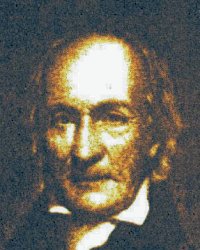Baptist preacher John Leland (1754–1841) helped provide religious foundation for ideas espoused by Thomas Jefferson, James Madison, and other founders concerning the appropriate relationship between government and religion. Born on May 14, 1754, in Grafton, Massachusetts, Leland was an indefatigable preacher, purportedly delivering 8,000 sermons by his 80th birthday in 1834.
Leland preached freedom in all aspects of life, including from established religion
Leland is known not only for his fiery sermons and evangelical zeal, but also for his opposition to slavery and his advocacy of strict separation between government and religion. Leland preached freedom in all aspects of life, exhorting his listeners to be free from sin, to oppose slavery and free others from physical bondage, and to be free from the “spiritual tyranny” of state-established religion.
Leland advocated for religious liberty protections in the Constitution
Leland was a friend to both Jefferson and Madison; he and his fellow Baptists supported Jefferson’s initial bill to ensure religious liberty in Virginia, and later took up the cause when Madison reintroduced it some years later. Tensions arose between Madison and Leland over the introduction of similar protections in the federal constitution. Madison did not initially think that additional amendments were needed to protect religious liberty, while Leland and his Baptist followers sharply disagreed.
In the aftermath of this split, Leland, who was then living in Virginia, had more votes than Madison for the Orange County seat at the Virginia Convention on ratifying the Constitution, despite the fact that Madison had drafted much of the Constitution. Eventually, Leland agreed to drop out of contest for the seat if Madison would work to include a religious liberty provision as an amendment to the Constitution. Madison then won out over his other opponents to attend the state ratifying convention. Leland’s ideas of separation were eventually included in the Connecticut, Massachusetts, and Virginia state constitutions.
Leland bluntly shared his beliefs on separation of church and state
In a July 4, 1802, sermon, Leland bluntly expounded his beliefs about separation of religion and government: “Never promote men who seek after a state-established religion; it is spiritual tyranny — the worst of despotism. It is turnpiking the way to heaven by human law, in order to establish ministerial gates to collect toll. It converts religion into a principle of state policy, and the gospel into merchandise. Heaven forbids the bans [sic] of marriage between church and state; their embraces therefore, must be unlawful.”
Leland disliked using religion as an election issue
Leland had little patience for those who would use religion as an election issue. In the same Fourth of July sermon, Leland warned, “Guard against those men who make a great noise about religion, in choosing representatives. It is electioneering. If they knew the nature and worth of religion, they would not debauch it to such shameful purposes. If pure religion is the criterion to denominate candidates, those who make a noise about it must be rejected; for their wrangle about it, proves that they are void of it. Let honesty, talents and quick despatch, characterise the men of your choice.”
Leland died January 14, 1841, in Cheshire, Massachusetts. His tombstone proclaimed, “Here lies the body of John Leland, who labored 67 years to promote piety and vindicate the civil and religious rights of all men.”
This article was originally published in 2009. John Ferguson is a senior lecturer of Business Law and Ethics at Utah State University. Prior to his academic career Ferguson spent eight years as the First Amendment Education Coordinator at the Freedom Forum First Amendment Center at Vanderbilt University. While there he traveled across the country working with schools and communities to resolve First Amendment related controversies and wrote extensively on First Amendment matters.

